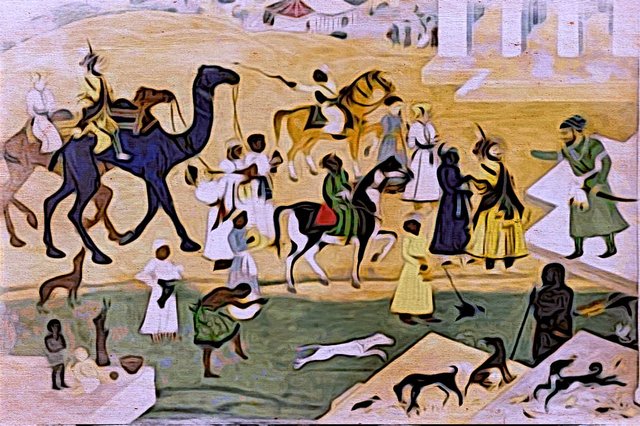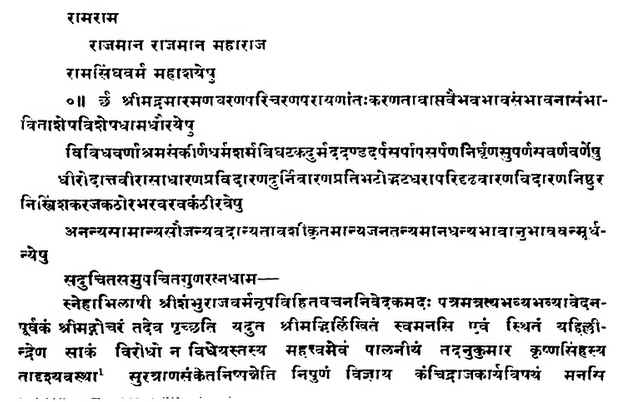
No amount of intellectual acrobatics and distortionist whitewashing can alter the historical fact that Aurangzeb was uniformly hated not just by Hindus throughout India but Muslim Nawabs and chieftains as well. Aurangzeb was and will a barbarian whose barbarism was sanctified by the doctrine of his religion of which he was one of the devotedly cruel practitioners. Needless, he spent almost his entire regime trying to quell rebellions that erupted like warts throughout his empire.
The Hindu side of this story must be put in perspective: Aurangzeb’s most dogged and feared foe, Shivaji did not rebel against him but built up a solid and enduring Empire from scratch and inaugurated another glorious epoch of Indian freedom struggle.
Shivaji's son Sambhaji or Shambhuji Raja carried his father’s blazing torch forward with the same grit, determination and unyielding ferocity. But for the unfortunate Battle of Wai and its aftermath, who knows when or how Aurangzeb’s blood-soaked Islamic despotism would’ve been short-circuited. While Sambhaji’s gruesome, torture-laden death is well-known, little is known about two Sanskrit letters just seven years before his death. Both letters are pretty much identical in content and both show his passionate resoluteness in his fight against Aurangzeb.
Importance
The two letters are distinguished for a crucial reason: for the first time, Sambhaji records his intent to actually overthrow Aurangzeb instead of merely fighting him. They also reveal Sambhaji’s unswerving devotion to the ancient Sanatana Dharma and the millions of its adherents both of which he dearly loved and cherished. The letters also paint a picture of exactly how much Aurangzeb was universally despised and the manner in which he went on a rampage to pulverize everything connected to Sanatana Dharma in the home of its own birth.
The other remarkable fact is that Sambhaji wrote the letters to Ram Singh, one of the trusted vassals of Aurangzeb. Sambhaji was fully aware that writing to him in itself was an adventure fraught with huge risk, yet he took it as part of his service to Sanatana Dharma. This thrilling episode in the spirited renewal of Sanatana Dharma under the doughty Maratha banner needs to be told and retold to both adults and children alike.
These Sanskrit letters were recovered from the Jaipur State Archives sometime in 1940 as part of a large collection of correspondence that took place during the waning years of the Mughal Empire. Bulk of this correspondence is in Hindi and they contain meticulous details of the transactions that took place both in the Mughal court and their Rajput loyalists in Rajasthan, mostly Jaipur. These documents also include graphic details of Shivaji’s visit to Agra in 1666.
The Context
Sambhaji had chosen Ram Singh for a reason that was imbued with statesmanship, Dharma, and most importantly, filial love.
Aurangzeb had deputed Ram Singh’s only son, Krishna Singh (or Kishan Singh) to faraway Maharashtra as the head of one of his army’s units to keep a watch on the hated Maratha infidels. However, Aurangzeb’s own son, Muhammad Akbar who had revolted against his father had fled to and sought refuge with Sambhaji. Krishna Singh readily gave him assistance, a fatal invitation. Sure enough, Aurangzeb put him to death on 10 April 1682 at the historic fort of Paranda, about an hour’s drive from Solapur. Krishna Singh was a mere boy aged 19 when he was beheaded. The next time you visit the Paranda fort, don’t forget to shed a tear of gratitude for Krishna Singh.
The Letter
Sambhaji himself was quite learned in Sanskrit and had a highly trusted Sanskrit scholar as one of his close ministers, the renowned Kavi-Kalasha or Kalusha. Kavi-Kalasha was also an accomplished traditional Pandit and Purohita and had vast and deep learning in Sanskrit literature. It is said that Sambhaji personally dictated these letters and Kavi-Kalasha wrote them down. Another account says that Sambhaji wrote it in his own hand and a fair copy was made by a scribe.
Scholars and historians reserve high praise for the eloquence and elegance of the Sanskrit prose in these letters. It is best to read the letters in their original (either in Sanskrit or in translation). No paraphrasing can do justice to their heartfelt passion, profound feeling of Dharma, and skillful diplomacy.
I have reproduced the most relevant portions from one letter dated November 1682 in Sanskrit and the relevant excerpts in English. Emphases have been added.

Translated Excerpts of Sambhaji's Letter
SHAMBHUJI RAJA TO RAJA RAM SINGH OF AMBER
Shri Shambhu Raja craves your friendship and after enquiring about your welfare communicates to Your Highness his own words in this letter.
We have received your communication and understand your object to mean that no opposition should be offered to the Emperor of Delhi…
Thereafter you came to know how your son Krishna Singh met his ruin for having intrigued with Sultan Akbar ; and after full consideration of the political situation you again wrote to us in laudable terms that we acted rightly in offering shelter in our dominion to Sultan Akbar, that you approved the course we followed and that as we are Hindus, you signified your readiness to execute whatever was considered expedient in the circumstances.
If such indeed is your real intention, then you yourself ought to take take lead in this affair. The present wicked Emperor believes that we Hindus have all become effeminate and tint we have lost all regard for our religion. Such an attitude on the part of the Emperor we cannot any longer endure. We cannot put up with anything derogatory to our character as soldiers (Kshatriyas). The Vedas and the codes enjoin certain injunctions of religion…which we cannot allow to be trampled underfoot, nor can we neglect our own duty as kings to our subjects. We are prepared to sacrifice everything, our treasure, our land, our forts, in waging war against this satanic Emperor. We have killed many a brave captain of the Emperor, imprisoned several, released some after exacting ransom, and some out of compassion; several effected their escape by offering bribes. In this way the imperial commanders have proved themselves utterly incompetent. The moment has now arrived when the Emperor himself can be captured and made prisoner with the result that we can rebuild our temples and restore our religious practices. We strongly assure you that we have resolved to execute all this in the near future.
But we are in comparison with you young and inexperienced. We have seen and heard so much about your valour and your zeal for religion. You at present fully possess the seven arms of kingship, so that if you muster courage and co-operate with us in the task of annihilating the power of this Emperor, we can accomplish anything! When we ponder on this situation, we feel extremely surprised to find that you keep yourself so quiet and so unmindful of your religion.
We are planning to dispatch [Muhammad] Akbar…into Gujarat, so that you on your side must courageously execute whatever is possible. Shah Abbas of Persia has signified his willingness to support the cause of Akbar; but it does not…behove us to accept Muslim help in this cause and enable Abbas to gain the credit. Was it not your own revered father Jai Singh who gained the honour of helping Aurangzeb to capture the throne of Delhi? You can now follow the same example and obtain the same credit by helping Akbar (to the throne). If he becomes the Emperor of Delhi with the help of the Muslims of Persia, they will gain predominance. It is necessary to prevent such a contingency. If you and we join our forces and place Akbar on the throne, we shall get the opportunity of protecting our religion and on your part, you will shed lustre on the house of Jai Singh.
My ministers Kavi-kalash and Janardan Pandit are writing to you separately at length…